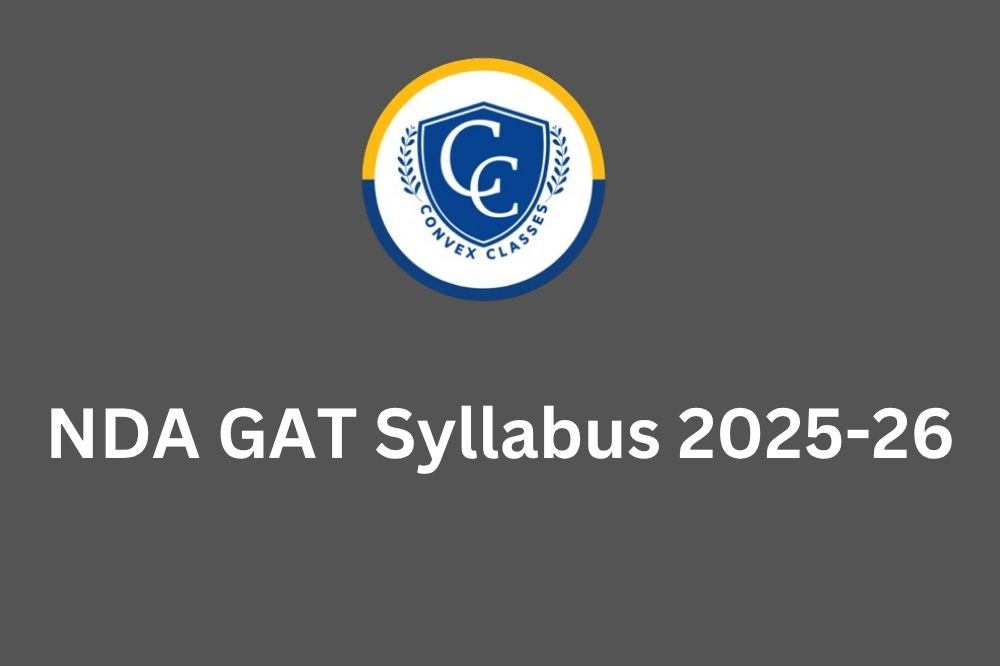The National Defence Academy (NDA) exam is one of the most prestigious competitive tests for those aspiring to serve in the Indian Armed Forces. The exam consists of two papers—Mathematics and the General Ability Test (GAT). This guide covers the complete NDA GAT Syllabus 2025–26 by breaking it down into two parts: English (200 marks) and General Knowledge (400 marks). Read on to learn the topics in detail, understand their weightage, and get tips for a balanced study plan.

Exam Overview
- Total GAT Marks: 600
- English: 200 marks
- General Knowledge: 400 marks
The GAT section assesses your proficiency in English and your overall general knowledge through questions from subjects like Physics, Chemistry, General Science, History, Geography, and Current Affairs.
Part A: NDA GAT – English Syllabus
The English section tests your language skills, focusing on reading comprehension, grammar, vocabulary, and sentence structure. Here’s a detailed, topic-wise breakdown to help you focus on what truly matters:
| Sr. No. | English Topic | Key Areas Covered |
|---|---|---|
| 1 | Grammar & Usage | Parts of speech, tenses, subject-verb agreement, active/passive voice, and usage of modifiers |
| 2 | Vocabulary | Synonyms & antonyms, word meanings, idioms, and figurative language |
| 3 | Reading Comprehension | Passage reading, identifying main ideas, drawing inferences, summarization, and contextual analysis |
| 4 | Sentence Structure | Error detection, sentence rearrangement, sentence formation, and correction of faulty sentences |
| 5 | Cloze Test & Fill in the Blanks | Understanding context to complete passages with missing words, logical sequencing, and context-derived answers |
| 6 | Para Jumbles & Ordering | Organizing sentences to form coherent paragraphs, logical flow, and effective paragraph construction |
Note: Regular practice through mock tests and reading diverse materials like newspapers and fiction will enhance these skills.

Part B: NDA GAT – General Knowledge Syllabus
The General Knowledge part is diverse, assessing your awareness of scientific concepts, history, geography, and current affairs. The table below breaks down the subjects and key topics along with an approximate weightage to help prioritize your study efforts:
| Sr. No. | Subject Area | Key Topics Covered | Approx. Weightage |
|---|---|---|---|
| 1 | Physics | Fundamental concepts, measurements, mechanics, properties of matter, simple experiments, and observations | ~25% |
| 2 | Chemistry | Basic principles, chemical reactions, atomic structure, periodic properties, and environmental chemistry | ~15% |
| 3 | General Science | Concepts in biology, environmental science, earth science, and a broad overview of interdisciplinary scientific topics | ~10% |
| 4 | History & Freedom Movement | Ancient, medieval, and modern history; the Indian Freedom Struggle; important historical events and personalities | ~20% |
| 5 | Geography | Physical geography, environmental geography, maps, climate, natural resources, and geographical phenomena | ~20% |
| 6 | Current Affairs | Recent national and international events, political happenings, socio-economic developments, and sports | ~10% |
Tip: Incorporate daily news reading and current affairs magazines, as stakeholders expect you to be aware of the latest trends and events.

Study Tips and Preparation Strategy
- Plan Your Time: Create a study timetable that allocates time to both English and General Knowledge equally. Emphasize weaker areas without neglecting your strengths.
- Practice Regularly: Make use of previous years’ question papers and practice tests. For English, focus on improving reading speed and comprehension; for GK, revise key concepts regularly.
- Use Quality Resources: Refer to standard school textbooks for science and history. Supplement your learning with specialized preparation materials and online mock tests designed for NDA aspirants.
- Stay Updated: Prepare for the current affairs section by following reputed news sources and monthly compilations.
- Group Study: Joining or forming study groups with fellow candidates can provide diverse insights and help reinforce learning.

Frequently Asked Questions (FAQs)
Q1. What subjects are covered in the NDA GAT syllabus 2025?
The GAT syllabus is divided into English (200 marks) and General Knowledge (400 marks), with the latter including Physics, Chemistry, General Science, History & Freedom Movement, Geography, and Current Affairs.
Q2. How should I prepare for the English section?
Focus on daily reading, practice grammar exercises, learn new vocabulary, and solve comprehension passages and cloze tests regularly.
Q3. What are the best strategies to cover the GK section?
Stay updated with current events, revise basic concepts in science and history, use visual aids like maps for geography, and consult standard textbooks for an in-depth understanding.
Q4. How important is the weightage of each subject in GK?
Each subject has a designated weightage (e.g., Physics ~25%, History ~20%). Knowing these percentages helps you prioritize topics based on their importance in the exam.
Q5. Are there any recommended study materials for NDA GAT?
Yes. Standard school textbooks, dedicated NDA preparation guides, and online platforms offering mock tests and video lectures can be highly beneficial.
Final Thoughts
Understanding the NDA GAT Syllabus 2025 in depth is the first step toward effective preparation. By breaking down the topics for both the English and General Knowledge sections, you can create a focused study plan to boost your confidence and performance on exam day.
Remember, consistency is key—regular practice, staying informed about current affairs, and skillful time management can make all the difference. Use this guide, along with quality resources, and start your journey toward joining the prestigious NDA with confidence.




